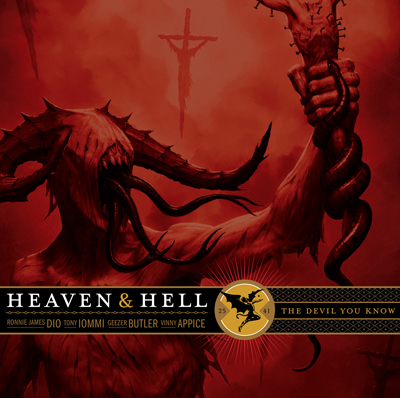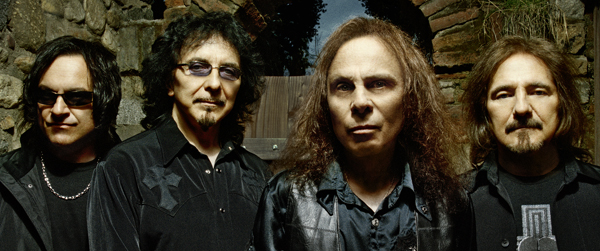
When I was in high school, back in the postpunk Silver Age, there was an unspoken hierarchy of stoners expressed in their hard-rock allegiances. The Alpha Heshers had their holy trinity of Zeppelin, Van Halen, and Hendrix; those who fancied themselves intellectuals added Pink Floyd to the mix, while your would-be mystics opted for the Doors, but mostly it was those three. The second-tier burnouts gravitated towards Blue Oyster Cult, Iron Maiden, Judas Priest — bands that rocked hard, but with strong iconography and an element of wit. The real bottom feeders, though, listened to Dio.

(I should note that in high school, I was listening to Big Country, Billy Idol, and the Police; and there’s only one of those that I regret today.)
You can see why teenagers are so attracted to heavy metal. There’s a huge cultural pressure on adolescents to engage with pop music at a time when they still lack confidence in their own aesthetic judgments. Absent an effective critical toolset for evaluating the art, teenagers (often unconsciously) latch instead onto extramusical factors when choosing music to consume, music that will effectively present their identities. Album art and videos assume an exaggerated importance; chart positions, perceived popularity (or lack thereof) among one’s peers, perceived acceptability (or lack thereof) among authority figures — all come into play.
As our esteemed Internet pal Andrew Weiss points out, metal is a terrific genre for insecure young people, because it is coded with distinct and — most importantly — quantifiable signifiers for perceived quality. You can easily form an opinion on a metal record without having to wander into the thorny thickets of “taste” and “judgment.” Indeed, it barely qualifies as “opinion” at all — it’s entirely fact-based. In modern metal, loud is always better than soft. Fast beats slow. Complex trumps simple. Not for nothing is this the genre that brought us five-string basses, seven-string guitars, and kits with more kickdrums than drummers have feet with which to play them.
With that more-is-more formula established, enter Ronnie James Dio. This little man, with his desperately awful hair and his leather lungs, had the peculiar genius to meld metal with heroic fantasy — a combination as potent as chocolate and peanut butter, for disaffected adolescents. Led Zep had dabbled in the Tolkienisms before, but they were obsessed mostly with sex; and for a kid who’s not getting any, listening to Percy caterwauling about his juicy ol’ lemon just adds insult to injury. Dio’s lyrics — whether with Rainbow, Black Sabbath, or solo — had zero erotic content. They were power fantasies, pure and simple; and if your fancy psychologist-types label that “sublimation,” well “¦ sometimes a wee man swingin’ a honking great sword is just a wee man with a sword.
https://youtube.com/watch?v=Sj7UBgVVew8
If anything, the Satan-and-sorcery backdrop turned not getting any into, well, a virtue. Within the cosmology of angels and devils expressed so urgently — if not particularly coherently — in Dio’s songs, sex was a distraction from the real struggle of good versus evil. (Also — and I’m a fine one to talk, being as I am no raving beauty myself, but — frankly the less I have to think about Ronnie Dio having sex, the happier I shall be.)
So a generation of kids listened to Dio and read Stephen Donaldson and played Dungeons & Dragons, and endured their shitty lives — because they could allow themselves to dream of being heroes, to dream that maybe God had a special plan for them. Which sounds unhealthy, maybe; but it’s a hell of a lot better than eating a shotgun, or getting lost in drugs, or even just choking on your own despair.
It’s a dicey business, growing up, and not everybody is ready for it at the same time or in the same way. And for some of us, metal helps to get us through — it’s the right thing when we need it. And were I still a teenager, the new album by Heaven & Hell — comprised of the same musicians who made up the Dio-era Black Sabbath — might feel like a lifeline. Hearing it as an adult, though, was an instant nostalgia trip.

I tried to get in the proper mindset, I really did — giving the CD its initial listen while drinking Milwaukee’s Best ($2.99 for a six-pack!) in a parked car on a school night — but The Devil You Know can never be anything more than an infantile pleasure for me. Dio’s lyrics leave no clichÁ© unturned (“changing the rules / just world full of fools” — man, I didn’t se that rhyme coming) and traffick in the high-stakes concerns that might have seemed profound when I was (a) a teenager, and (b) really high, but which now can’t help seem kind of quaint. Listening to the opening “Atom and Evil,” I couldn’t help wonder how long it’s been since anyone last wrote quite such a passionate anti-nuclear song; the Cold War has been over for a lo-o-o-ong time. The packaging is hilariously tacky, with its Lovecraftian cover painting and faux woodcuts; all that’s missing is a Wandering Monster Check table.
But infantile or no, I’ve got to admit: it is a pleasure. Tony Iommi has always been an underrated guitarist; it occurs to me that — and there’s no way to say this that isn’t going to sound fatuous, so let me just come out and say it — he’s basically a hard-rock Miles Davis. Less important as a soloist per se than as a melodic innovator, he, like Miles, introduced new modal approaches to rock composition. He doesn’t stray much from E minor — the People’s Key — but within that framework he has an unerring instinct for finding the Wrong Note, the one that turns a pedestrian lick into something sinister.
There’s nothing new here (the title The Devil You Know wins this year’s “truth in advertising” award), just four old pros delivering the goods. But if anything it’s a little too monochrome. With the exception of “Eating the Cannibals” — a surprise tribute to 80s one-hit wonders Toto Coelo (not really) — the tempos stay at a thunderous crawl. Dio gets to show off his legato technique, and drummer Vinny Appice keeps things simmering along; but the ratio of churners to gallopers is tragically skewed. Iommically speaking, it’s all “Iron Mans” and no “Paranoids,” and taken as a whole the disc can’t help but sag a bit.
Still, it’s enough to keep me bobbing my head and throwing the horns for a few songs — even if the riffs don’t linger in my head. That’s the drawback of Iommi’s approach, which in the long run sounds, if not exactly arty, then academic. (He even looks professorial, with his little eyeglasses.) Avoiding soothing tonalities, Iommi puts together uncomfortable, unresolved riffs with the dedication of a twelve-tone serialist — and like serial music, the results are profoundly uncatchy. There are just no hooks. Dio’s vocals are as technically-impressive as ever, but there’s no singalong factor. It’s fun while it lasts, but no longer — immersive, but unmemorable. Heaven & Hell may be on the side of the angels, but the devil, as always, has all the best tunes.




Comments